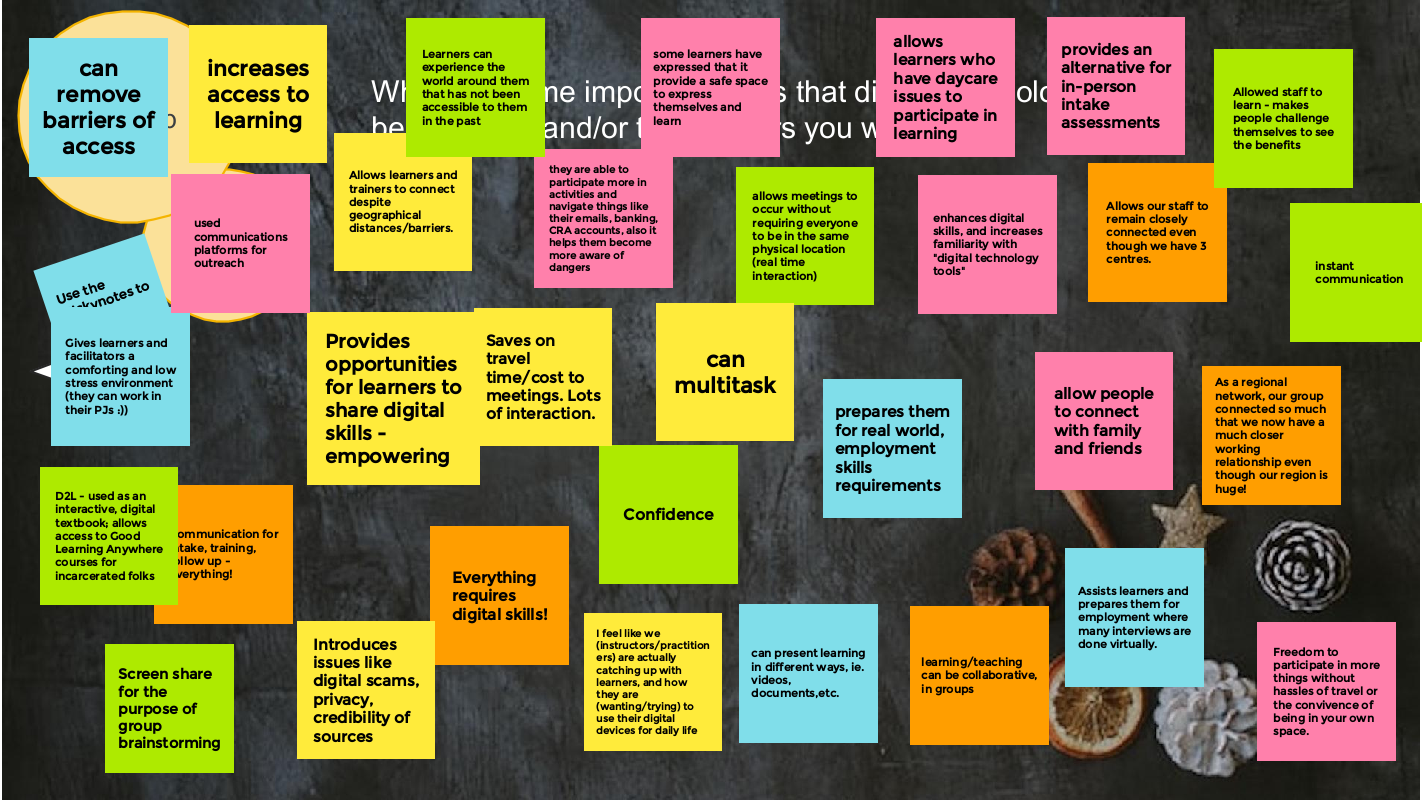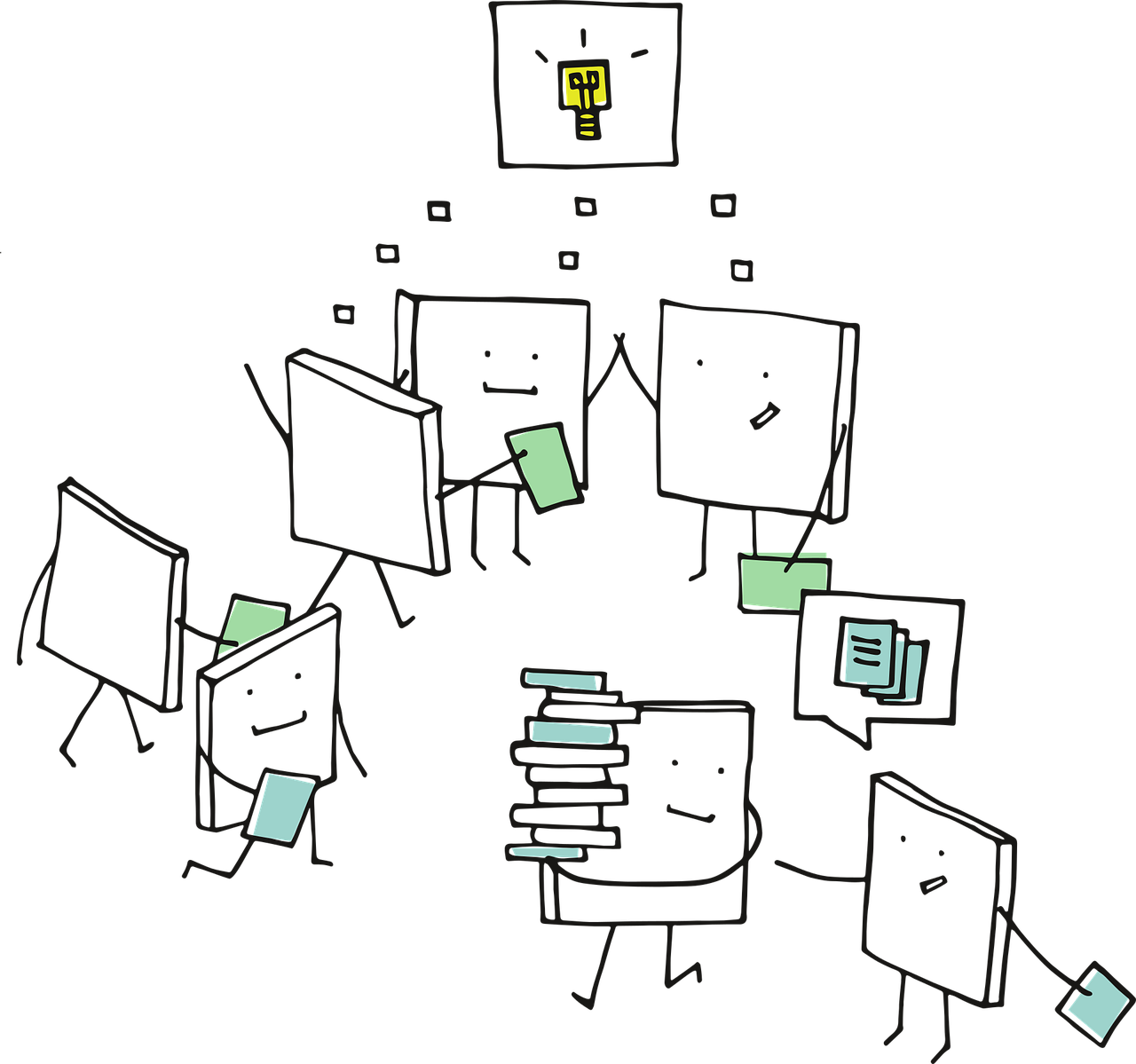Have you heard about AI text generator in Canva? Simply start a Doc in Canva and use + symbol to select Magic Write.
Click the link below to see the Instagram video – you do not need an account or be logged in.
On April 13, 2023 AlphaPlus hosted our seventh Community Gabfest.
The conversation starter was Digital Inclusion / Digital Justice: what does it mean to literacy programs?
This gabfest follows upon the discussion at Calgary Learns. Susan Lefebvre from Metro Toronto Movement for Literacy (MTML) got in touch to talk about how we can bring this conversation to Ontario.
We explored
- the difference between Digital Inclusion (making sure everyone has the devices and connectivity they need) and Digital Justice (making sure that everyone can experience connectivity the same way).
- what our roles as literacy practitioners are, if any, in each of these domains.
We used a Jamboard to guide our conversation: Wayfinders Gabfest 7 Jamboard.
We started by brainstorming some of the ways that digital technology benefits us and/or the learners we work with. I think this is the fullest Jamboard frame I have ever seen.
We looked at Bill’s story (see below) and talked about diversity of ways we see people using technology skills and literacy skills to navigate the world. We also talked about the assumptions that are made about who uses digital technologies (why and how they use them) and how that ties in with assumptions about who has literacy skills and skills deficit approaches to education.
We talked about what digital inclusion means. We concluded that essentially it comes down to issues of affordability and that as long as the provision of internet access remains a private sector, for profit venture, affordability will continue to be an issue–especially in an era where we seem to moving to more privatization of public services.
When we tried to answer the question about the role of literacy programs in addressing the issue of digital inclusion, as one person said, there was a “startling pause.” It was felt that it though would be quite natural and for people who work in literacy programs to be part of developing inclusion strategies because of their deep knowledge of the impacts and realities of lack of access, program workers are stretched pretty much to the limit. To add on the work of trying to solve a problem that is really one of government regulation and investment, as essential as it is, is just not feasible.
We rounded out the afternoon by grappling with the notion of digital justice. We reflected on Jane’s story (see below) and how access to your data and artifacts is a human right. We talked about how when we work with learners in online spaces, we are often in private spaces. The reason we get to use them for free is because our data and our attention is a valued commodity that gets traded on a market that is largely opaque to most users. People acknowledged that this is the sea we swim in — our ability to change the sea is quite limited but, in this case, there was a lot of energy in the discussion about the role of literacy programs in the digital justice domain. There is a lot we cannot change but we can use our literacy skills, our educator skills and our finely honed critical thinking skills to make the opaque transparent for ourselves and for the learners who are swimming alongside us.
We though that perhaps we could start with language. The jargon of digital spaces and the inconsistent ways language is used in different places and by different people is disruptive to connectivity. For example, are two-factor authentication, two-step verification and multi-factor verification all the same thing or does each term mean something different? Literacy people are language people. People saw ways that they could demystify the language as part of media literacy activities and lessons.
Audrey Gardner recommended a video to us on CBC Gem called “You’re Soaking in It” as a way to make this more understandable to ourselves.
We wrapped up by talking about how to bring this information to literacy learners and how to be transparent about the digital learning environments we are taking learners to. We thought one place to start might be the Media Literacy section of the Educator Network Blended Learning Toolbox.
Tracey and Guylaine were sparking with ideas about other ways AlphaPlus can support the field in this endeavour. More on that soon.
Thank you Gabfesters for your energy, generosity, wisdom and friendship. With your help, we won’t fall off the learning curve.
The Calgary Learns Digital Justice Panel
“A digital justice approach to literacy education asks not if people can access the Internet and digital technologies but rather how different groups experience online worlds.” — S. Smythe and D. Pelan (2019) Digital literacy and digital justice
Here is the link to the video of the discussion panel.
These are the articles we were invited to read before the panel:
- S. Smythe and D. Pelan (2019) Digital literacy and digital justice
- S. Smythe (2022) Beyond Crisis, Toward Justice:New Technologies in Community-BasedAdult Learning
And these links were shared at the event:
- Calgary Learns Digital Divide webpage
- AlphaPlus Digital Inclusion Playbook.
- Metro Toronto Movement for Literacy Digital Literacy Library which includes the resource Accessibility Settings on your Smartphone
- The City of Calgary Digital Equity work
- Design Justice Principles
- Allied Media Projects – Consentful Tech Project
Digital Justice Case Studies
from S. Smythe and D. Pelan (2019) Digital literacy and digital justice
Neil Selwyn (2010; 2014) asks,
“Who benefits in what ways from Internet connectivity?
How does the Internet amplify rather than disrupt existing social patterns and relations?”
(p. 96).
Welfare offices often do not provide help with the application process, nor access to the technology, and so applicants are referred to libraries and community agencies such as tech cafés for help. This requires people to share intimate details about their lives with people they may not know well, an often demoralizing and humiliating experience, and ironically one that people are warned to avoid in the interest of data privacy. The multi-step welfare application process also requires an active email address (and therefore a password and password recovery protocol) and a current digital photo uploaded with the application (requiring a camera, skills to save and upload the photos and so on). The consequence is that people often fail in their welfare applications the first time, moving into deeper precarity.
Google has redesigned its verification protocols to prevent the use of stolen devices and hacking. This is no doubt a positive development for many, but carried catastrophic consequences for Jane, a precariously housed woman who relies on public access computing and who must keep her most precious information on the cloud. Jane lives in a women’s shelter and relies heavily on her Gmail account to communicate with friends, family and work. She uses her cloud storage to keep important photos and documents safe and accessible but does not have her own device, instead relying upon one of the many public computers available in the community. Changes to Gmail’s security features led to flags of suspicious activity because she logs in to multiple computers each day. One afternoon her login attempt at a community centre was flagged as possible “hacking”, with a warning message that because she was logging in from an unknown device she would need to verify that she owned the account before she could access it. Ownership could be verified by a secure access code texted to the phone number she provided when she set up the account or, by verifying the month/year the account was created, then answering the security questions she set up at the time. Jane no longer has access to the cell number listed as the phone was recently stolen, a sadly common occurrence for citizens who stay in shelters. The account was created such a long time ago that Jane could no longer remember the exact month. Indeed, who among us could remember that? After several attempts Jane’s account was locked ‘until she could provide proof’ of ownership. But there were no other options for proving ownership and in those few moments, Jane lost access to her vital documents, contacts, phone numbers, and main method of communication with no way to retrieve them. Such experiences of disconnection are deeply disruptive and traumatizing for those with histories of personal loss and abandonment.
Bill often attends the tech cafés to learn more about how to use his laptop. He is confident and fluent in his online activities and an active participant in social media. One day, Bill brought in a paper-based form for housing and asked if we could help him find it online but unfortunately, the housing provider would only accept hard copies of the application (a rarity indeed)! This caused Bill enormous anxiety. After a brief discussion it became clear that English was Bill’s second language, he did not see himself as a good speller, and he felt that he did not have legible writing. He stated that this made him feel stupid even though he wasn’t. He preferred to do the form online as the computer would correct his spelling and sentence structure. As digital literacy educators and researchers, situations such as this lead us to question the boundaries between print and digital literacies, and linear views of skills that place people in categories of ‘who is ready’ for digital literacy and who is not. For Bill, digital technologies allowed him to overcome the barriers of print literacy, even if the design of the system still posed difficulties.
A Blended Learning Toolbox by and for Ontario literacy educators
As part of the Educator Network Blended Learning program, literacy practitioners share the resources that are most helpful in creating lessons and activities that engage learners and enhance and expand learning.
This is the collection from the Winter 2022 group.
These are the blended learning resources, activities and tools that practitioners have tested and are recommending. On some pages you will see their reviews or tips.
We start with an explanation of some of the terms we used and a link to a website about curating resources.
We have included an index. Some topics have several pages. If you open the PDF in a browser, you can use the back button to return to the index.
Use the link in the sidebar to open and download the collection.
Here’s what you need to know about our new open educational resources library
- You can access the materials with one-click.
- All materials are free and reproducible for your learners and most are modifiable.
- Each resource has a description along with information about allowable uses.
- The first four of ten topics are now available. We’ll release more topics in the upcoming months.
Half the planned topics in the library are focused on developing overall literacy and numeracy capabilities, many of which introduce innovative instructional approaches. Other topics will address learner interests and goals such as supporting children with their learning or preparing to write the food handler’s test to gain a certificate.
You’ll be able to supplement published workbooks with PDF workbooks, interactive digital activities, online courses and lessons presented in Slides. Modifiable resources allow you to change the content to reflect an Ontario context and better reflect student experience and interests.
We’ve also made it easy for you to build your collection by setting up folders in Google Drive that contain many of the resources. You’re sure to find at least one new gem that you can add to your personal collection.
On March 9, 2023 AlphaPlus hosted our sixth Community Gabfest.
The conversation starter was Lori Armstrong’s video The Personal Web.
Lori is a knowledgeable and inventive literacy instructor who currently works at the Thunder Bay Literacy Group and will soon be moving to the Lakehead Adult Education Centre (part of the public school board in Thunder Bay).
In the summer of 2022, Lori participated in the AlphaPlus Wayfinders Maker Space and created a video about the Personal Learning Web – a map of how Lori works with learners to identify the ways connection, relationships and power impact the whys and hows of learning for each of us differently and specifically.
We used a Jamboard to guide our conversation: Wayfinders Gabfest 6 Jamboard.
It was a lively and engaging discussion as usual.
We started by talking about the elements that create good learning. We then watched the first part of the video — the overview of the Personal Web — and moved to breakout rooms to discuss how the web resonated with us and our practice. One group made connections to the issue of digital justice.
We watched the second part of the video and stayed together to talk about how teachers dance with chaos and navigate the web of webs. We all found that the pace and flow of Lori’s video — her calm and encouraging tone — put us into an open-minded and meditative space.
Lori finished the session by walking us through some of the ways she has been expanding the personal web concept.
Lori shared a couple of examples of how she’s been extending her Personal Web reflections lately. She showed us how she
- mapped the Anishinaabe Seven Grandfather Teachings onto the Personal Web and
- explored the ways that ADD might be mapped and how the Personal Web can nurture a conversation about the specific ways different people with ADD can be supported as learners
- uses the personal web to work with groups of learners
The PDF linked below shows some concept mapping for the following:
- Page 1: Understanding / discussing Indigenous cultural values (the example here is the Anishinaabe 7 Grandfather Teachings, which I have worked with in a few of the local high schools and adult education programs for Indigenous students).
- Page 2 and 3: Understanding and supporting learners affected by ADHD. I have been researching this because it is such a prevalent condition among my learners and also in my family and community. I have also recently been gob smacked to discover that I am an ADD-affected person, as well.
- Page 4: A simplified think/plan tool that might be used by an individual to prioritize activities for a class, a day, or a week.
Thank you Lori for sparking this good conversation and for your generosity in sharing your research and insights with us.
Thank you all Gabfesters for your wisdom, experience, knowledge and, most of all, your fine collegiality.
We agree with this participant: “Brilliant!! Incredible learning, thank you so very much! Always a pleasure.”
On February 9, 2023 AlphaPlus hosted another in our series of Community Gabfests.
We started by asking people about where they like to learn best.
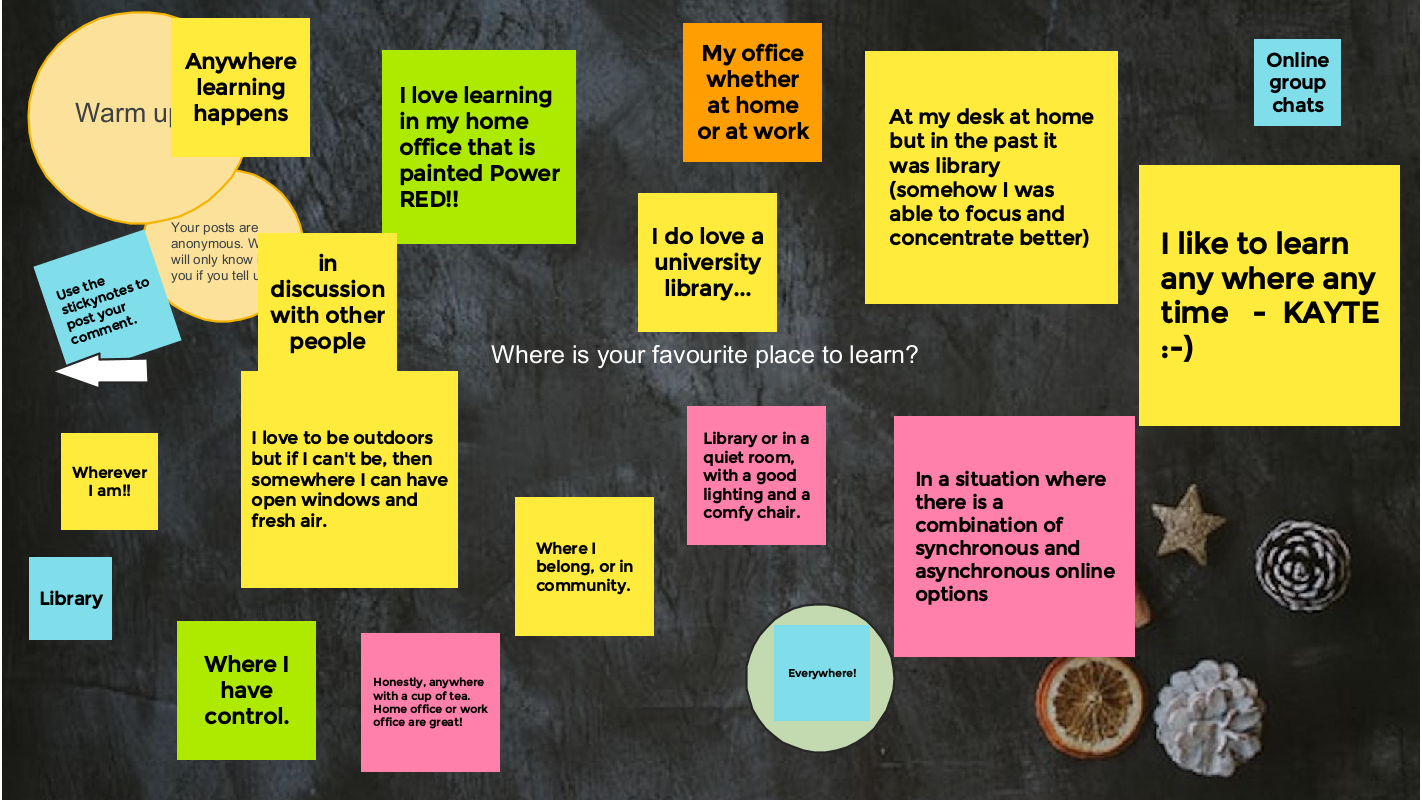
The conversation starter was: If there were no barriers to running a program, what program would you want to run?
We talked about
- If you had the freedom to create your ideal learning place, what would it be like?
- If learners had the freedom to create their ideal learning place, what would it be like?
- How does the tension between dreaming big and working within the constraints of reality strengthen and/or weaken programming?
We moved into break out rooms to discuss the three questions.
Here is what the groups shared on the Jamboard.
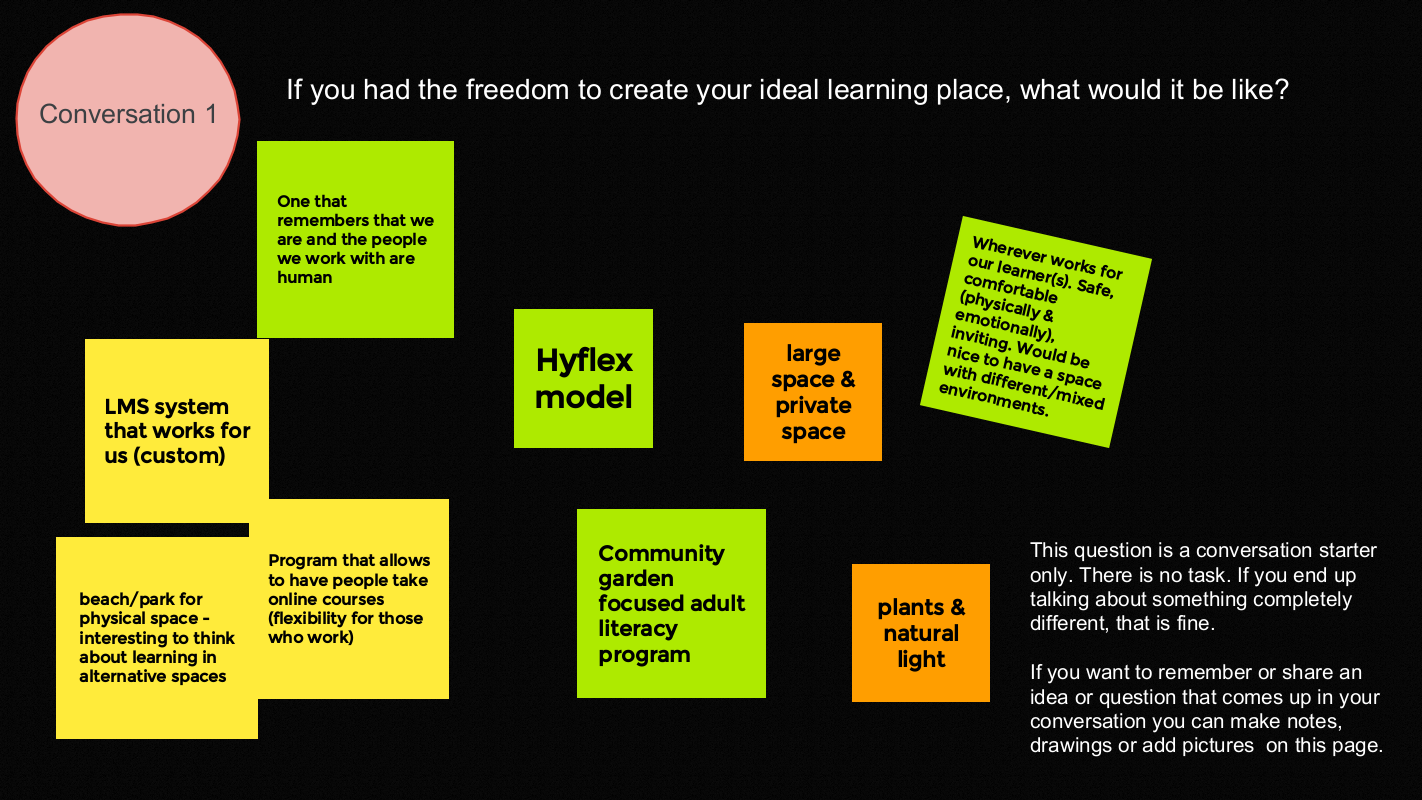
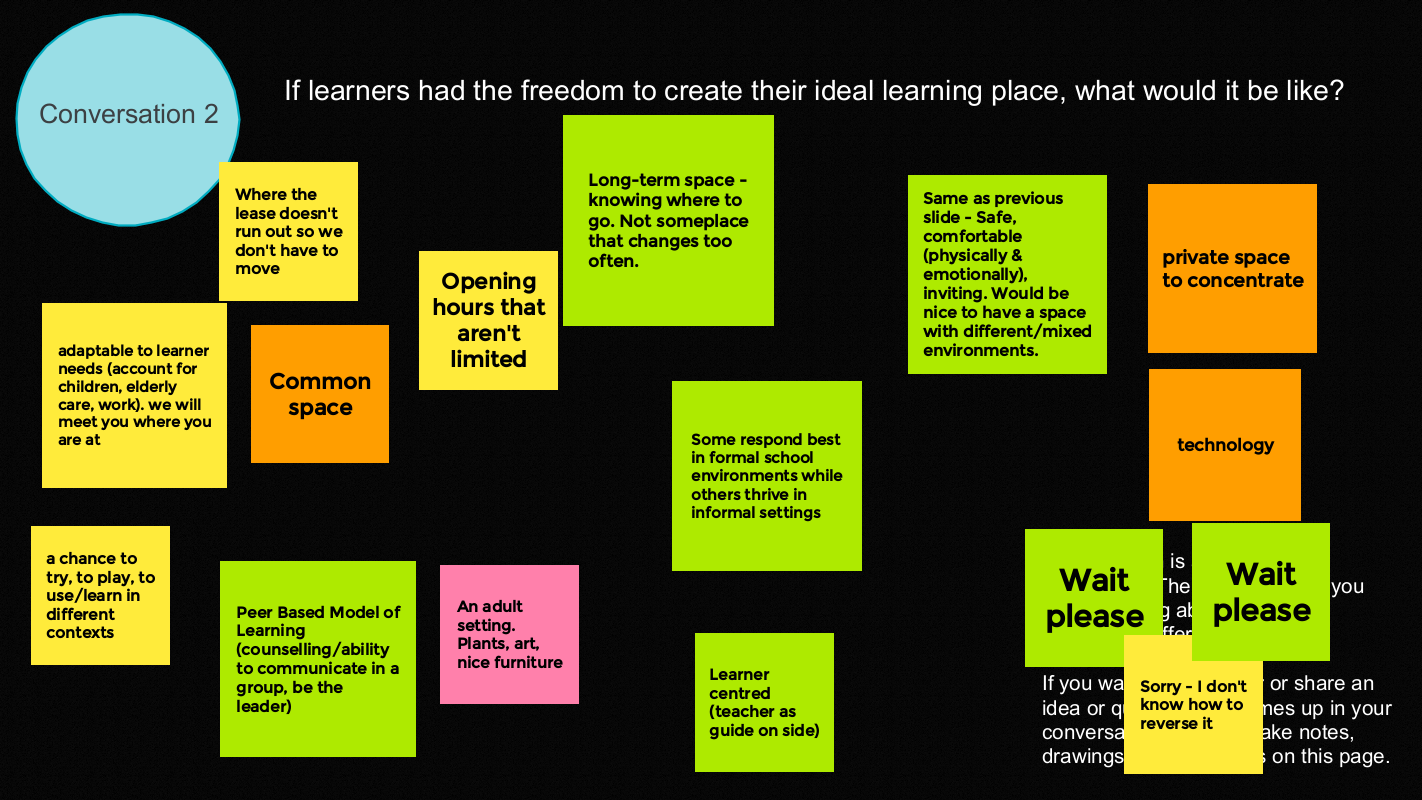
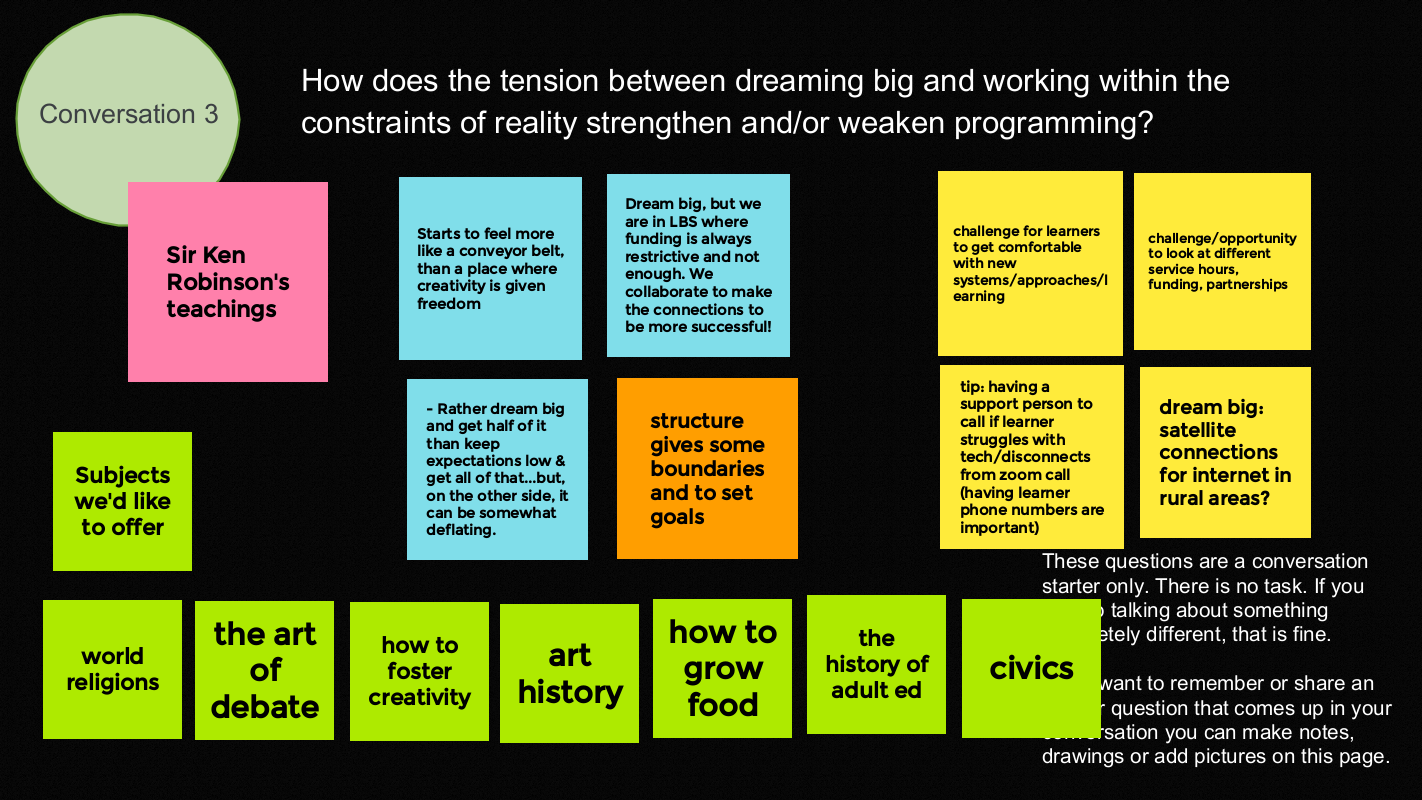
We wrapped up by thanking each other for their contributions and generosity.
- Amazing session everyone. Thank you for your ideas and support!
- What a creative group of problem solvers.
- The enthusiasm is encouraging and infectious.
- Being with people who understand what we do is invigorating.
- Has anyone suggested changing the name? The word ‘gab’ gives me a connotation of idle chitchat, which doesn’t reflect the inspiring conversations that occur. Maybe Community Conversations, or something…
On January 12, 2023 AlphaPlus hosted another in our series of Community Gabfests.
We started by asking people to share the things that they were proud of from 2022.
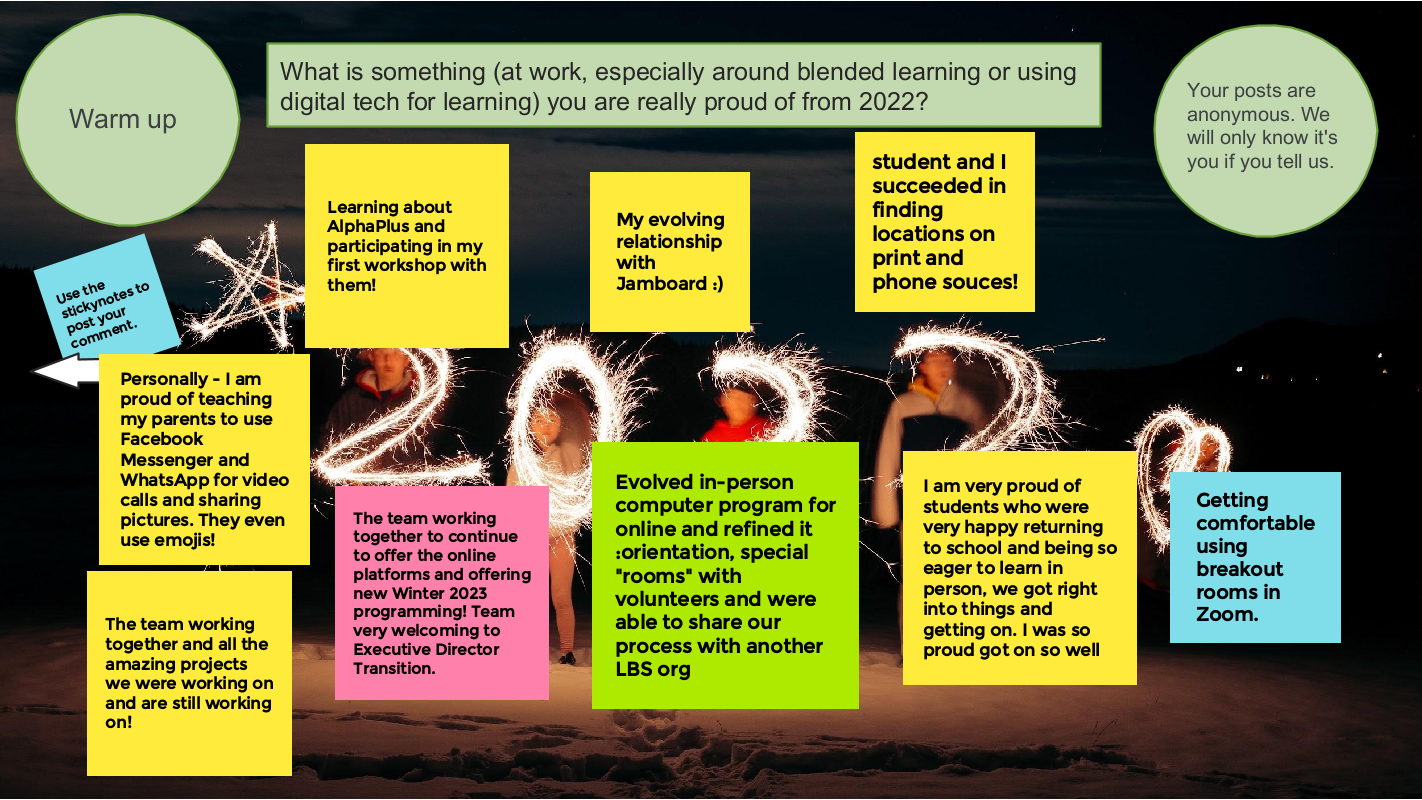
The conversation starter is: New Year’s Blended Learning *Aspirations
We talked about
- what is going well
- what we are proud of from 2022
- what we want to try next
- who / what could help us
*not Resolutions – the things that are still in dreams, wishes and ambitions phase of planning.
We had a an amazing conversation about
- what went well in 2022
- the specifics of what it means to start where learners are at when we include digital technology as part of that
- the challenges of supporting learners and reducing barriers to learning in the marketplace of apps and devices
- what educational technology we are using and how it is working
- we shared ideas about what technology we want to use and people in the group who were already using that technology shared their expertise
- Smartboards and hyflex and hybrid learning – where some learners are in the bricks-and-mortar classroom and some are connecting remotely – and how people are making it work
- bite-sized learning and byte-sized learning (examples: Skillswise and Rumie)
- the AMAZING Metro Toronto Movement for Literacy Smartphone project
- the changing definition of blended learning and how do we know we are doing it
- how to create independent learning modules, or bytes, in an emergent curriculum context and could H5P be part of the solution
- who used the Winter Break H5Ps in their class 🙂
It was inspiring and interesting.
We wrapped up by thanking each other for their contributions and generosity.
- It is amazing to work with people on their learning adventure!
- Thank you so very much everyone. Your inspiration is great!
- Thanks so much for sharing all your wonderful information
- Thank you for inspiring us!
- Thank you for the excellent ideas and resources!
On November 24, 2022 AlphaPlus hosted another in our series of Community Gabfests.
We started by asking people to share the things that people love about them.
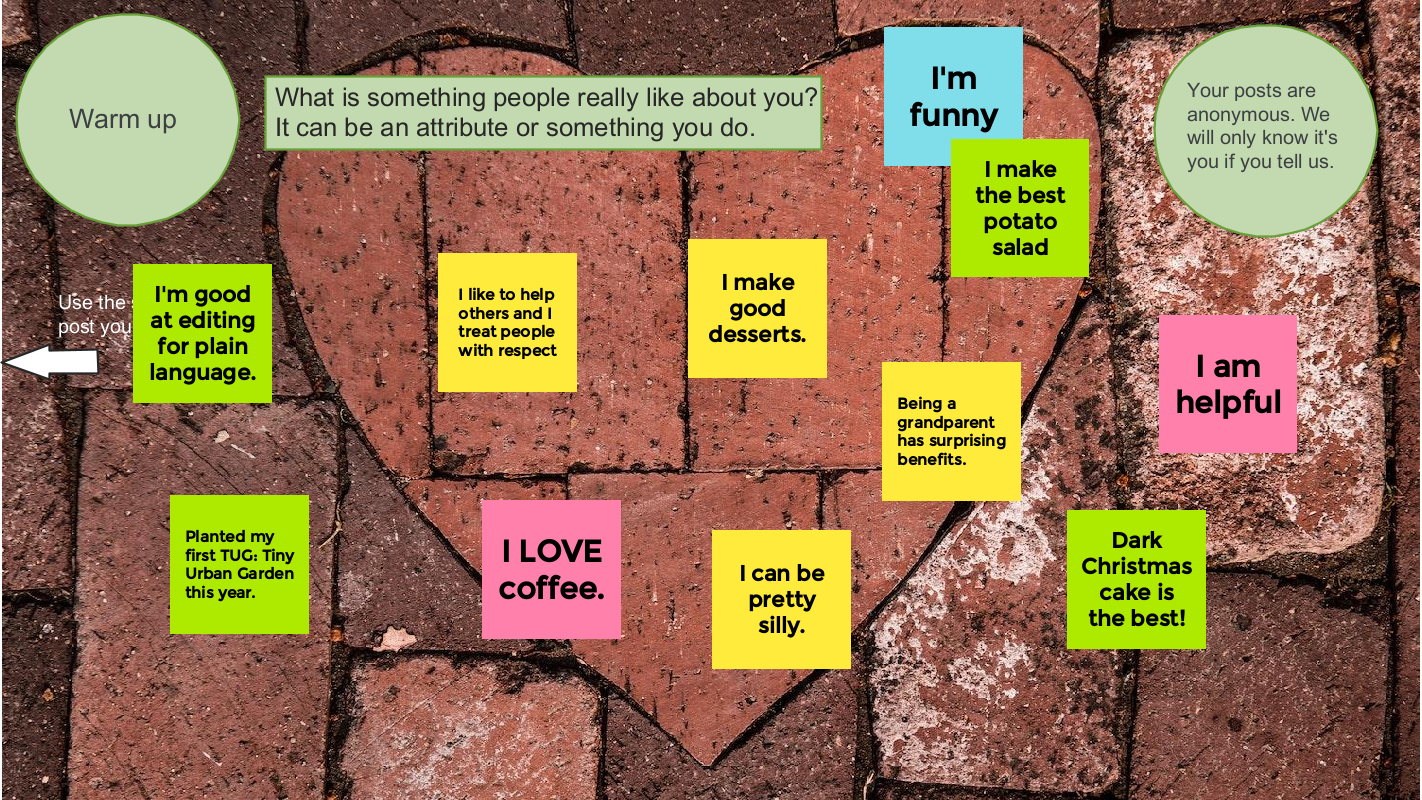
Our conversation starter was: Learner identity (and blended learning)
Here is what Wayfinder Evan Hoskins said:
Each learner has a connection to the past to be considered. All teachers know … every student comes to learning with a different backstory … and you have to know how to adapt your teaching methods quickly. For example, one day we’ll be talking to a learner about how they learn while dealing with anxiety. On another day we will have to talk about what happened in their world before they dropped out of high school in grade nine. What made them not feel comfortable on the computer? We as teachers learn how to help the learner work through that emotional pain in order to gain the confidence needed to learn how to use the computer, to get their fingers moving again.
What do you think? How do you navigate this terrain and support learners as they develop their learner identities and confidence?
We had a an amazing conversation about
- what we need to know about people so that they can thrive in literacy programs
- how working with learners is an iterative process of experimentation and discovery as literacy facilitators work to find the learning environments that work best for each participant
- the challenges of supporting learners and reducing barriers to learning while mapping boundaries and expectations
- the challenges of nurturing our own mental health and staying energized so we can do the work that we love
- how pandemic recovery is about more than economic opportunities and assessing where we are in terms of digital technology integration
It was a lot. And it was inspiring and validating.
We wrapped up by thanking each other for their contributions and generosity.
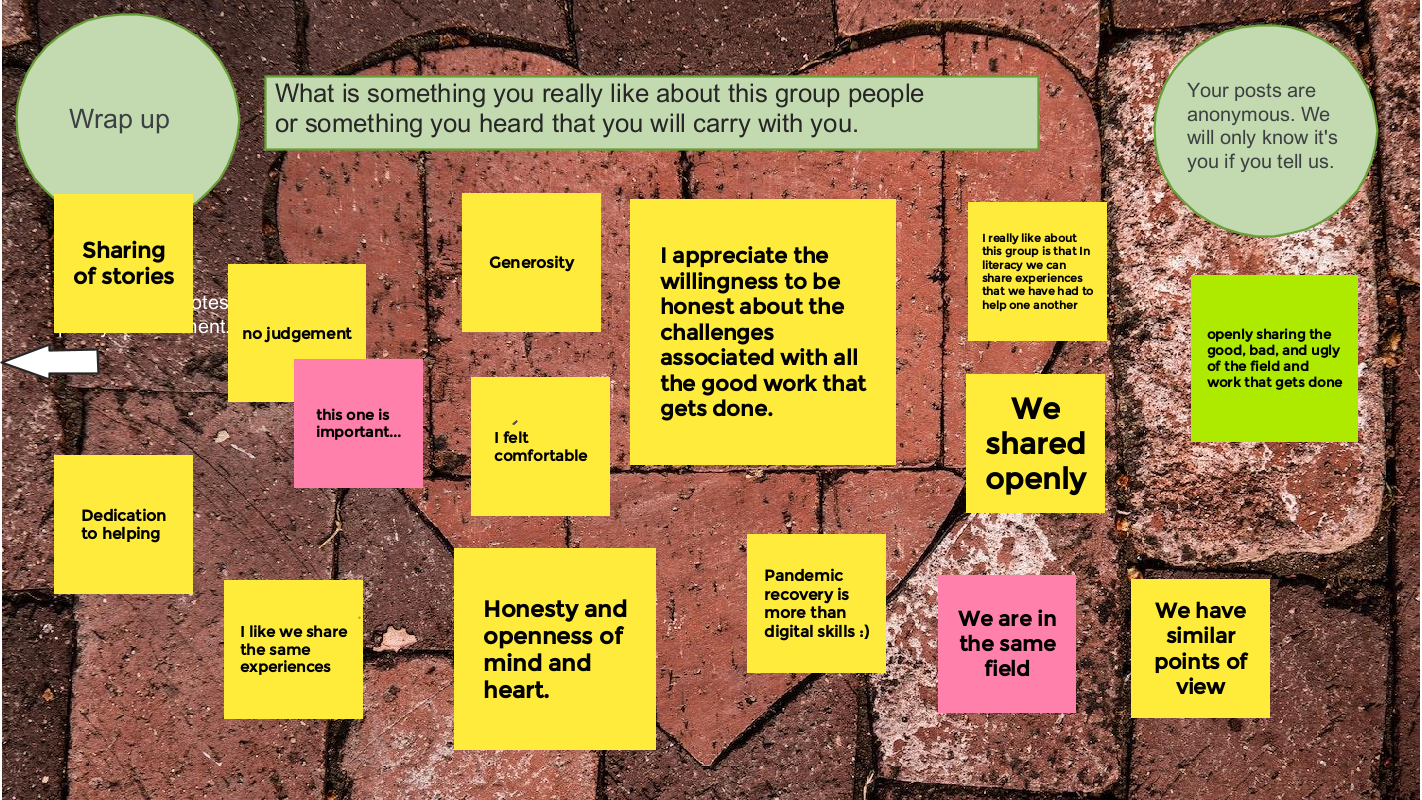
Presenters from four programs share how they are expanding learning and accessibility with mobile devices and apps.
To learn about more Apps for education, check out our Useful Apps collection.
On October 27, 2022 AlphaPlus hosted our second Community Gabfest.
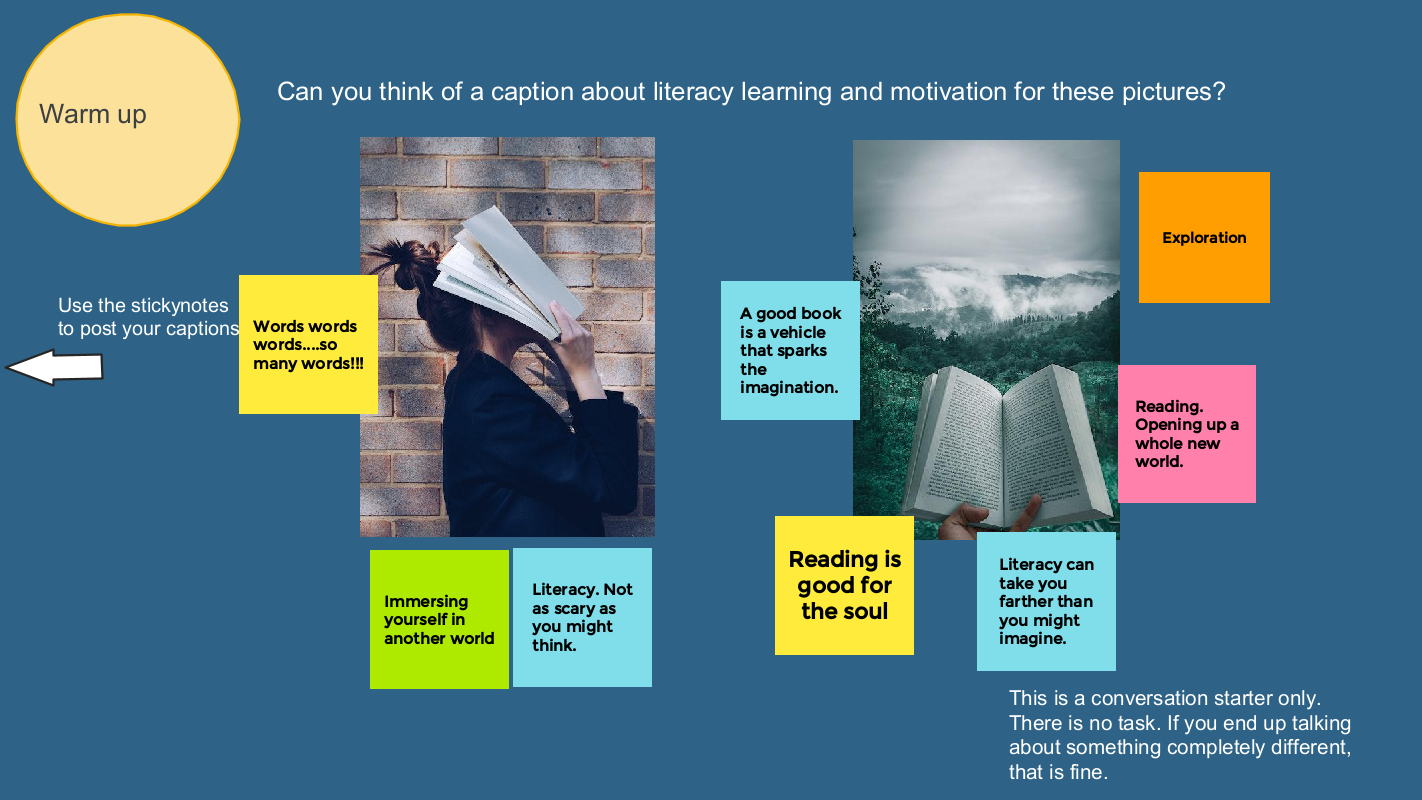
We asked the September participants to share their ideas for conversation starters. We got a great list. We decided to combine two ideas that we thought might go together.
The conversation starter for the October Gabfest is warm ups and motivation.
- What are some warm up ideas instructors use with their class?
- What techniques or approaches are people using to engage learners and keep them motivated on their educational journey?
We started with an Answer Garden warm up: What is your favourite thing about talking to literacy workers?
We used a Jamboard to guide our conversation: Wayfinders Gabfest 2 Jamboard.
More warm ups here:
